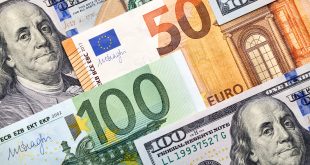US stocks closed higher on Friday as progress was made in talks to raise the US debt ceiling, while chip stocks jumped for the second day amid optimism about artificial intelligence.
After several rounds of talks, a US official told Reuters that US President Joe Biden and Republican House Speaker Kevin McCarthy are close to reaching an agreement to raise the government’s debt ceiling of $ 31.4 trillion for two years, with a spending cap on most items.
The Standard & Poor’s 500 indexes closed up 1.31 percent at 4,205.46 points. The Nasdaq Composite Index increased 2.19 percent to 12,975.69 points, while the Dow Jones Industrial Average rose 1 percent to 33,093.27 points at the close.
US Core PCE inflation increases to 4.7%
The change in the Personal Consumption Expenditures (PCE) Price Index in the United States increased to 4.4% on an annual basis in April, up from 4.2% in March, according to the US Bureau of Economic Analysis on Friday. This number was higher than the market’s forecast of 3.9%.
The annual Core PCE Price Index, the Federal Reserve’s preferred measure of inflation, increased to 4.7% from 4.6% in the same period, above experts’ expectations of 4.6%. Core PCE inflation and PCE inflation both climbed 0.4% month on month.
Personal income increased 0.4% on a monthly basis, while personal spending increased 0.8%, according to the data.
U.S. personal spending quickens in April
Consumer spending in the United States increased in April, despite Americans feeling the pressure from rising interest rates and rising prices.
According to statistics released on Friday by the Commerce Department’s Bureau of Economic Analysis (BEA), personal consumption adjusted for inflation increased by 0.5% on a monthly basis, accelerating from a flat pace in March.
According to the BEA, shoppers spent more money on pricey things like as vehicles and auto components, as well as more money on insurance and financial services.
Meanwhile, personal income increased by 0.4% month on month, up from 0.3% previously, with compensation driven by private earnings and salaries.
US core capital goods orders rebound in April
New orders for important US-made capital goods surprisingly climbed in April, prompting cautious hope that company spending on equipment may improve in the second quarter after two consecutive drops.
The Commerce Department said on Friday that orders for non-defence capital goods excluding aeroplanes increased 1.4% last month, a frequently monitored indicator for company spending intentions. Data for March were revised higher, showing that these so-called core capital goods fell 0.6% rather than 1.1% as initially reported.
USD
The dollar fell on Friday, but remained close to the highest level in two months against major currencies, amid expectations that US interest rates will remain high for a longer period.
Tension still hangs over the market due to the US debt ceiling negotiations between President Joe Biden and Republican House Speaker Kevin McCarthy, although the news that the two were close to reaching an agreement raised investor sentiment and halted the rise of the dollar.
The dollar fell from its highest level in six months against the yen in Asian trading and settled in the latest trading at 139.77 yen, after hitting 140.23 yen in the previous session, the highest level since November.
The dollar index fell 0.13 percent to 104.09 points against a basket of currencies, retreating from the highest level in two months, which it recorded on Thursday at 104.31 points.
However, the index was on track to gain more than 0.8 percent for the third week in a row as traders’ expectations increased about how high interest rates in the United States could go.
Money markets expect by 40 percent that the Federal Reserve will increase the interest rate by another 25 basis points at the monetary policy meeting next month, while expectations that it will start cutting interest rates later this year have receded.
Data released on Thursday showed that the number of Americans filing new applications for unemployment benefits rose last week to 229,000, lower than expected.
Europe
European stocks rose on Friday, supported by the mining and technology sectors, although the main indices were on their way to incur big weekly losses, as investors feared the US debt ceiling crisis and the global economic slowdown.
The pan-European STOXX 600 index was up 0.4 percent by 0707 GMT, after falling to an eight-week low at the close on Thursday.
Mining stocks rose 2.6 percent, following the path of higher metal prices, with global sentiment improving following progress in US debt ceiling negotiations, and technology stocks continued their recent series of gains.
Among mining companies, Rio Tinto rose 3.6% after Morgan Stanley (NYSE:MS) upgraded the stock’s rating.
French supermarket operator Casino, which is heavily indebted, fell 9 percent as it resumed trading after being suspended earlier this week.
UK retail sales fall in May
Retail sales in the United Kingdom fell this month following a little increase in April, but retailers expect sales volumes to normalise in June as consumer confidence rises and energy costs decrease, according to a poll released on Thursday.
The monthly distributive trades index of the Confederation of British Industry (CBI) decreased to -10 in May from +5 the previous month.
A measure of predicted sales in the coming month increased from -7 to zero.
German Economy
In early 2023, the German economy entered a recession as household spending in Europe’s economic engine succumbed to the pressures of soaring inflation.
When corrected for price and calendar impacts, GDP declined by 0.3% in the first quarter of the year, according to a second estimate released by the statistics office on Thursday. This follows a 0.5% drop in the fourth quarter of 2022. Two consecutive quarters of decline are generally used to characterise a recession.
German GDP numbers revealed “surprisingly negative signals,” according to Finance Minister Christian Lindner on Thursday. He went on to say that when compared to other highly developed nations, Germany’s economy was losing capacity for development.
Gold
Gold prices rose on Friday as the dollar retreated from a two-month high, but were on track for a third straight weekly loss as traders assess progress in US debt ceiling negotiations and await the Federal Reserve’s next monetary policy move.
And by 0311 GMT, spot gold rose 0.3 percent to $ 1945.39 an ounce, after hitting its lowest level since March 22 at $ 1936.59. US gold futures rose 0.1 percent to $1,945.90.
But the yellow metal has fallen 1.6 percent since the beginning of the week.
The dollar fell 0.1% on the day, but remained near its highest level since March 17. Benchmark Treasury yields are also close to the highs seen in March.
On Thursday, US President Joe Biden and House Speaker Kevin McCarthy appeared to be closing in on spending cuts and raising the government’s debt ceiling of $31.4 trillion, with little time left to spare the country the risk of default.
As for other precious metals, spot silver rose 0.3 percent to $22.83, platinum rose 0.4 percent to $1,024.63, and palladium rose 0.3 percent to $1,420.40.
Oil
Oil prices rose on Friday as US officials appeared close to reaching an agreement on the government’s debt ceiling and while the market assessed mixed messages about supplies from Saudi Arabia and Russia ahead of the next meeting of the OPEC+ alliance on production policy.
Brent crude rose 69 cents, or 0.9 percent, to settle at $76.95 a barrel, and US West Texas Intermediate crude rose 84 cents, or 1.2 percent, to $72.67 a barrel.
On a weekly basis, the two benchmarks recorded gains for the second consecutive week, amounting to 1.7 percent for Brent and 1.6 percent for WTI.
However, markets remain cautious as talks to raise the debt ceiling are likely to drag on, and there have been new concerns about a possible interest rate hike by the Federal Reserve next month that would dampen demand after strong consumer spending and inflation in the United States.
An official in US President Joe Biden’s administration said that although negotiators could reach an agreement on Friday to raise the US government’s debt ceiling of $ 31.4 trillion, the talks could extend through the weekend.
Both benchmarks fell more than $2 a barrel when they settled on Thursday, after Russian Deputy Prime Minister Alexander Novak played down the chances of approving a new production cut at the OPEC+ meeting in Vienna on June 4.
 Noor Trends News, Technical Analysis, Educational Tools and Recommendations
Noor Trends News, Technical Analysis, Educational Tools and Recommendations





